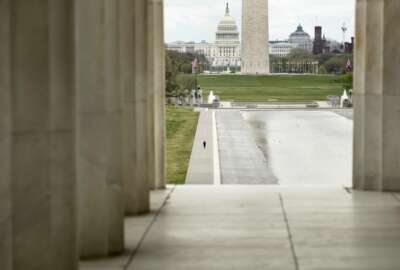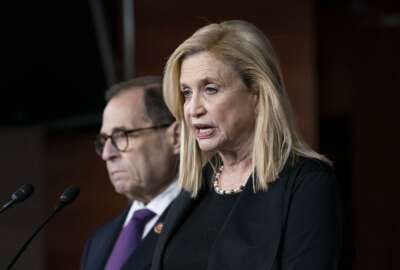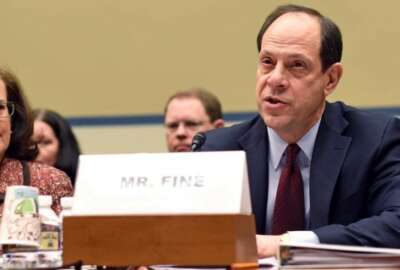
Rep. Connolly: Select pandemic committee not ‘a substitute for regular oversight’
Congress has approved nearly $3 trillion to keep government services and the economy running during the coronavirus pandemic, but standing up the layers of...
Congress has approved nearly $3 trillion to keep government services and the economy running during the coronavirus pandemic, but standing up the layers of oversight into that spending has gone less smoothly.
The House approved a resolution Thursday to create a select committee on the coronavirus, under the auspices of the House Oversight and Reform Committee, despite pushback from Republicans at a House Rules Committee Wednesday.
Ranking member Tom Cole (R-Okla.) and House Oversight and Reform Committee Ranking Member Jim Jordan (R-Ohio) objected to standing up a select committee, arguing that the $2 trillion Coronavirus Aid, Relief, and Economic Security (CARES) Act has already stood up more than half a dozen oversight mechanisms for pandemic spending.
Meanwhile, Rep. Gerry Connolly (D-Va.), chair of the oversight committee’s government operations subcommittee, said the select committee isn’t “a substitute for regular oversight” from the permanent committee.
“That has to be restored, and so making that happen is certainly going to be on my top priorities, because I think there have been a lot of weaknesses in the system that have been exposed during the pandemic,” Connolly said in a webinar hosted by MeriTalk.
For example, Connolly pointed to the committee’s requests for briefings from Office of Personnel Management and Census Bureau officials that haven’t been met for several weeks.
Congress struggles to deploy tech ‘to vote safely but remotely’
Meanwhile, House leadership decided against a scheduled vote Thursday to approve a temporary rules change that would allow some members to vote in-person on behalf of others.
Instead, it created a task force that will more closely examine the issue, and how Congress can better adapt to emergencies like the coronavirus pandemic.
Task force members include Majority Leader Steny Hoyer (D-Md.), Minority Leader Kevin McCarthy (R-Calif.) and the leadership of the House rules and administration committees.
Connolly said Thursday’s in-person vote, which brought at least 360 members to the Capitol, stood out as “very strange circumstances for the Congress, which has not yet figured out how to deploy technology to vote safely but remotely.”
“That presents a safety hazard for our staffs or Capitol Police, or people on airplanes and trains and for members of their families as well,” he said. “We obviously don’t want to be vectors for spreading the pandemic, but we also have an obligation to the people. So it’s a very strange, almost apocalyptic environment in which I vote today.”
More than a million feds ‘left in limbo’ over telework
While agencies have had better maximizing their remote capabilities during the pandemic, Connolly pointed to a recent OPM telework report that shows 1.3 million federal employees who don’t yet qualify for telework have been “left in limbo because of a lack of guidance, lack of infrastructure, lack of the proper equipment and lack of approval.”
“Telework needs to be integrated into the federal workforce, and federal contract workforce as well, and that it’s there for the rainy day. It’s a good thing in terms of productivity and morale.”
Connolly also urged Congress to approve emergency spending for the Postal Service, which expects to run out of cash to operate by the end of the fiscal year.
The Postal Service’s precarious financial situation, he added, jeopardizes the jobs of more than 600,000 postal workers, the vast majority of whom continue to report to work in-person.
“They’ve had almost no assistance during this pandemic, and that’s going to change too,” Connolly said.
In a virtual town hall on Tuesday with Sen. Bernie Sanders (D-Vt.), National Postal Mail Handlers Union President Paul Hogrogian said at least 1,800 postal workers have tested positive for coronavirus or are presumed positive.
At least 30 postal workers, Hogrogian said, have died as a result of the coronavirus.
Boosting independence of IGs
Meanwhile, House Democrats have worked on including language in the next pandemic spending bill to strengthen the independence of IGs from the executive branch.
This comes after President Donald Trump removed former acting Defense Department acting IG Glenn Fine as the head of the Pandemic Response Accountability Committee, by naming a new acting DoD watchdog.
The president made that decision just a week after the president fired intelligence community IG Michael Atkinson, telling the House and Senate intelligence committee that he no longer had confidence in Atkinson to do his job.
Connolly described a conference call shortly after Fine’s removal, in which 74 members of the Council of the Inspectors General on Integrity and Efficiency discussed the possible chilling effect the president’s actions could have on their jobs and the pandemic committee.
“[It] really sent shivers throughout that community, like ‘Are we going to be punished for doing our jobs?” If we succeed in intimidating IGs from doing their jobs or cutting corners or holding back on robust conclusions, then we have damaged the system entirely,” he said.
While the leaders of 20 House committees have asked CIGIE chairman Michael Horowitz for further legislative input, Connolly said he and other lawmakers have considered seven-year terms for most IGs and strengthening language in the existing bill that would limit a president’s authority to remove an IG to “for-cause” scenarios.
Connolly said he would push to modify the language to include a “documented” reason for a president to remove an IG.
“I don’t want any weasel words to allow each president or vice president to be able politically to remove IDs because they’re doing their jobs [and] following the law,” Connolly said.
In the bill so far, lawmakers have outlined those causes to include “permanent incapacity, inefficiency, neglect of duty, malfeasance, conviction of a felony or conduct involving moral turpitude,” as well as “gross management” and “gross waste of funds.”
A 2019 Congressional Research Service report found that all but two IGs posts can serve indefinitely. As for those exceptions, the Postal Service serves a seven-year term and can be reappointed for an unlimited number of terms.
Meanwhile, the Capitol Police IG serves a five-year term, but hold the job for up to three terms for a total of 15 years.
Copyright © 2025 Federal News Network. All rights reserved. This website is not intended for users located within the European Economic Area.
Jory Heckman is a reporter at Federal News Network covering U.S. Postal Service, IRS, big data and technology issues.
Follow @jheckmanWFED





